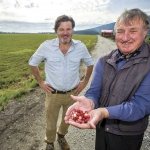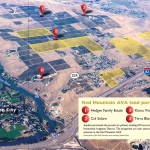Red Mountain is one of Washington State’s most desirable appellations, with grapes from some vineyards commanding thousands of dollars a ton.
The AVA has long focused on serving winemakers at the upper end of the market, with grape purchases based on the track record of established growers and collaborative relationships between buyer and seller.
But with 500 acres developed in the past three years, and the prospect of significant new acreage being developed by a virtual stranger to the local grape industry, the Red Mountain AVA is at a watershed moment.
The tall dark stranger that’s stepped into eastern Washington is the Aquilini Investment Group of Vancouver, British Columbia, a private, family-run Canadian company best known for its ownership of the Vancouver Canucks hockey franchise as well as myriad real estate investments.
But it also owns thousands of acres of berries in the Fraser Valley and a dairy operation in Sunnyside, Washington.
And, when the Kennewick Irrigation District auctioned off 31 parcels of land totalling more than 670 acres on November 23, 2013, Aquilini trumped 38 other bidders with a winner-takes-all offer of $8.8 million.
The deal shocked local growers, wineries, and bidders who had flown in from California for the once-in-a-lifetime event.
Owned by the irrigation district since 1943, the parcels will benefit from new irrigation infrastructure the district has undertaken with a view to supporting expanded grape production on Red Mountain.
Speculation
This has made Aquilini’s plans a matter of hot speculation, with the group itself holding its cards close to its chest.
The only public statement regarding the company’s plans—an interview with family patriarch Luigi Aquilini wasn’t possible prior to deadline—sought to reassure neighbors, striking a conservative but positive note.
“We are in the process of determining the best grape varieties to grow in the region with the intention of developing and planting the land as soon as possible,” Aquilini said in response to media queries shortly after the auction.
By all accounts, the transaction was a last-minute deal made with knowledge of the potential and value of the properties but little planning.
This is the point on which Aquilini’s ambitions hang, according to veteran grower Dick Boushey.
“It’s so competitive, and you need to do everything right,” he said. “I think they’re going to be on this big learning curve. You don’t just jump into this business.”
The first consideration is what to plant, and where to plant. Many of the parcels Aquilini acquired have acreage that’s unsuitable for grape production, and what remains may be better suited to particular varieties than others.
And then the market may also have a taste for some varieties that are less suited to the mountain than others.
“You want to match perfectly the site with the variety, but the market dictates a lot of it,” Boushey said. “[If] they think people are just standing in line to buy those grapes—well, they’re not. You’re going to have to go out and sell them.”
Boushey expects Cabernet Sauvignon to be among the key varieties Aquilini plants, but even then, there are a number of considerations.
Aquilini hasn’t mentioned plans to make wine from its grapes, and, in any event, the potential scale of the planting means it will need to sell to other growers—something Boushey says can’t be left to chance if Aquilini wants to maximize its revenues from the fruit.
“Most wineries don’t just jump on board [with] a young vineyard,” he said. “They want it to prove itself, and they’ll take a little bit, but they aren’t going to commit to the whole thing until it gets some age on it.”
While some of the parcels Aquilini has acquired neighbor well-known vineyards such as Ciel du Cheval, Kiona, and Klipsun, Aquilini’s status as a new entrant means it will have to build confidence in its ability to manage and produce top-quality fruit from its properties.
This is different from the approach taken by many new entrants to the state that enjoy greater name recognition—one thinks of Bonny Doon’s launch of Pacific Rim as well as the new Canvasback project Duckhorn Vineyards is launching with Red Mountain fruit.
To some extent, E&J Gallo’s streamlining of the offerings of Columbia Winery is possible largely because of the larger reputation of the parent company backing it up. (Gallo has reduced the number of wine types they are producing at Columbia Winery, reportedly focusing more on red varieties.)
Aquilini hasn’t set a timeline for the development of its new holdings, but given the dearth of available plant material in the state, the family will likely proceed at a pace that may actually support a gradual integration into the local industry. •



Leave A Comment